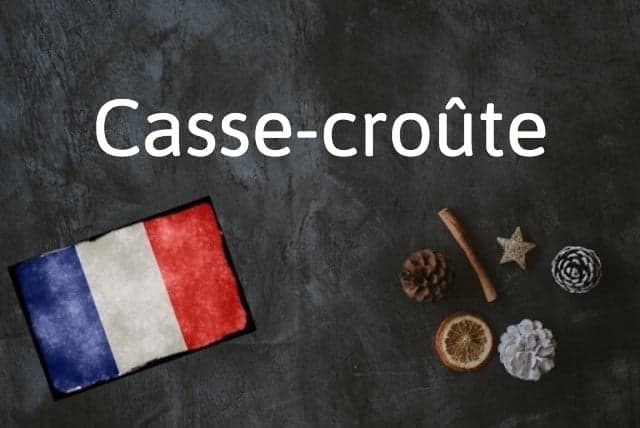French word of the day: Casse-croûte

The French don't snack, but there are delicious exceptions to the rule.
Why do I need to know casse-croûte?
Because it's a delightful way to break up the dullness of lockdown and add some tasty French culinary joy to the casse-tête of a coronavirus emergency we're in the midst of.
What does it mean?
Casse-croûte literally translates to 'break-crust' but it's really a snack.
But.. I thought the French don't snack?
You're right, they don't. But a casse-croûte is the delicious exception to the rule. (Anyone who has studied the French language will know that there are always - always - exceptions to all rules.)
READ ALSO: Eleven phrases that will let you complain like the French
A casse-croûte can be most things except for a real meal. It's one of the few French food traditions that does not follow strict rules (breakfast being sweet, lunch being at 1pm, cheese coming after dinner - the list is long).
T'as prévu un casse-croûte pour la route? - Did you bring a sandwich for the road?
J'ai tellement faim, je me fais un petit casse-croûte. - I'm so hungry, I'm going to make a small snack before dinner.
Alternatives
Casse-dalle means the same. Dalle means hunger (a lot of it). Avoir la dalle means 'starving'.
Encas is another option, which probably comes from the expression en cas de, which loosely translates to 'just in case'.
There's also collation, which can mean a 'light meal'.
Other ways of saying casse-croûte are goûter or snack, however goûter specifically designates the 4pm snack that French children (and some adults) eat, which usually consists of a sweet treat. There's less leeway with a goûter than a casse-croûte.
Snack is less used, plus it's an English reference that would not fly particularly well with the French language guardians at Académie Française.
READ ALSO: 11 'French' words that aren't really French at all
Comments
See Also
Why do I need to know casse-croûte?
Because it's a delightful way to break up the dullness of lockdown and add some tasty French culinary joy to the casse-tête of a coronavirus emergency we're in the midst of.
What does it mean?
Casse-croûte literally translates to 'break-crust' but it's really a snack.
But.. I thought the French don't snack?
You're right, they don't. But a casse-croûte is the delicious exception to the rule. (Anyone who has studied the French language will know that there are always - always - exceptions to all rules.)
READ ALSO: Eleven phrases that will let you complain like the French
A casse-croûte can be most things except for a real meal. It's one of the few French food traditions that does not follow strict rules (breakfast being sweet, lunch being at 1pm, cheese coming after dinner - the list is long).
T'as prévu un casse-croûte pour la route? - Did you bring a sandwich for the road?
J'ai tellement faim, je me fais un petit casse-croûte. - I'm so hungry, I'm going to make a small snack before dinner.
Alternatives
Casse-dalle means the same. Dalle means hunger (a lot of it). Avoir la dalle means 'starving'.
Encas is another option, which probably comes from the expression en cas de, which loosely translates to 'just in case'.
There's also collation, which can mean a 'light meal'.
Other ways of saying casse-croûte are goûter or snack, however goûter specifically designates the 4pm snack that French children (and some adults) eat, which usually consists of a sweet treat. There's less leeway with a goûter than a casse-croûte.
Snack is less used, plus it's an English reference that would not fly particularly well with the French language guardians at Académie Française.
READ ALSO: 11 'French' words that aren't really French at all
Join the conversation in our comments section below. Share your own views and experience and if you have a question or suggestion for our journalists then email us at [email protected].
Please keep comments civil, constructive and on topic – and make sure to read our terms of use before getting involved.
Please log in here to leave a comment.